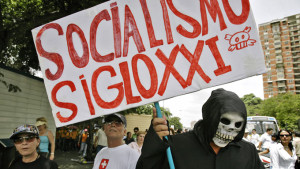By Carlos Sánchez-Berzaín
August 1, 2016
 The Castro dictatorship was saved from its collapse and “special period” by Hugo Chávez, who since 1999 gave to Fidel Castro and his regime the means and oil, not only to stabilize the Cuban economy, but to take forward the political project that started as the Bolivarian Revolution and ended up being called the 21st Century Socialism.
The Castro dictatorship was saved from its collapse and “special period” by Hugo Chávez, who since 1999 gave to Fidel Castro and his regime the means and oil, not only to stabilize the Cuban economy, but to take forward the political project that started as the Bolivarian Revolution and ended up being called the 21st Century Socialism.
Through an anti-imperialist speech to take absolute power, they reenacted –with electoral populist manners—the communist Caribbean guerrilla that decades before tried to control the region.
Castrism was imposed in Venezuela, Ecuador, Bolivia and Nicaragua, through a non-democratic political system that carries its economic model. Cuba and the XXI century socialist countries live in different degrees the crisis of the Castro economy, they look as well for excuses to disguise the results of this historically failed and despised model.
An economic model, is among other concepts, “the notion that is used to nominate the process arranged by a government to organize the economic activity”. The 21st Century Socialism model, is just the Castro model, organized to fit the process initiated by Chávez and Castro in the new century. It is funded in the Marxist philosophy. It is centralized, state ruled, interventionist, and progressive.
National economy must be under state control and the chief of government (dictator) must remain to perpetuity. He must be the final decision taker in economic activities, forcing a “legal” order. The model is the enemy of free initiative, free trade, private property and free market; although, it is willing to tolerate it temporarily, until he defeats it, destroys it, and takes its place.
The essential component of the centralized, interventionist, state run Castro model, is corruption. The concentration of power in economic decision taking, the pseudo-infrastructural development, interventionism, makes corruption a must. They create new rich, a new kind of phony businessmen and even a new middle class or social class, like the “Boliburguesía” (new Bolivian Bourgeoisie). In reality, it is a model of economic corruption, where free initiative and competition are substituted by the power of the boss who does what he wants, becoming not the governor, but the owner of the state.
The most advanced application of the Castro model –21st Century Socialism—is without question in Cuba, that’s why, it is the nation with the harshest economic crisis. They created a “parasite state”, non-productive, not self-sufficient, and dependent. The regime has always depended on foreign aid.
The USSR helped them survive until the Soviet Union collapsed by the same disease: Marxist economy, given place to the “special period” in Cuba, until Hugo Chávez arrived with the Venezuelan wealth to keep the system.
The model is so inefficient that it has consumed and destroyed the source of wealth, creating the Venezuelan crisis. The Castro economy is eating the chicken with the golden eggs. The same model has been partially applied in Ecuador, Bolivia and Nicaragua, where the political system of the 21st Century Socialism, is fully implemented through the disappearance, division and luck of independence of state power.
The systematic violation of civil rights, the unlawful withholding of power to perpetuity, the disappearance of political freedom, and freedom of the press, the existence of political prisoners and exiles, and more. Just like in Castro’s Cuba, but with simulation of democracy and electoral fraud.
The stronger the system is applied, the fastest the crisis is uncovered. Corruption becomes notorious, as well as inefficiency and simulation. Capitals flee the country and inevitably, bankruptcy arrives, as they are experts in increasing public expenses and crushing revenues.
The rulers of Cuba, Venezuela, Ecuador, Bolivia and Nicaragua, try to hide their failure behind the low prices of oil, minerals, and other commodities, but their argument is as bad as their economic model.
It turns out to be, that international prices have gone down for everyone, including countries like Chile, Peru, Mexico, Uruguay and others with democratic governments, regardless of their political inclination; countries who have alternation in power, free elections, free initiative, freedom of the press, simply freedom… Purely stated, they have no crisis, neither the imminent future of extinction as the regimes of the 21st Century Socialists.
The heart of the matter is that in Cuba, Venezuela, Ecuador, Bolivia and Nicaragua, the economic crisis is structural. It is the Castro style economics, a governmental and political state model, not circumstantial. That’s why, sooner than later, applying the same economic principles that Marx stated, who said that: “the economic infrastructure determines the social and political superstructure”, we will see how the governments of the 21st Century Socialism disappear for being impractical, a fact that will leave a deep situation of poverty and dependency among the people in the countries that they oppress, under the artificial promise of liberation.
 Carlos Sanchez Berzain Abogado | Estadista | Político | Politólogo
Carlos Sanchez Berzain Abogado | Estadista | Político | Politólogo